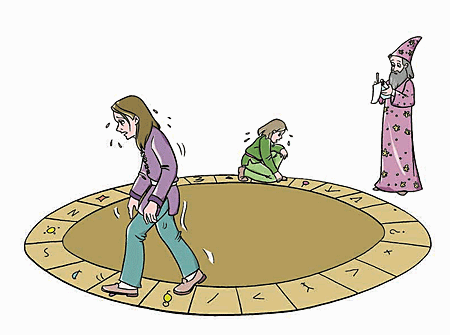gyro-, gyr-
(Greek: turning, spinning, whirling, bend, circular motion; originally, "circle, curved, ring")
gyroidal
1. Turning the plane of polarization circularly or spirally to the right or to the left.
2. Spiral in arrangement or action.
2. Spiral in arrangement or action.
gyroma
A turning round.
To make circular, spherical, or cylindrical; to surround; to encircle; to encompass.
gyromagnetic
1. Relating to or caused by the magnetism produced by the spinning motion of a charged particle.
2. Resulting from the magnetic properties of a spinning, electrically charged particle.
2. Resulting from the magnetic properties of a spinning, electrically charged particle.
Divination by walking in a circle until dizziness which caused a person to fall and this was interpreted in various ways: In gyromancy, a circle of letters can be used, and when a person walking around on this circle becomes dizzy and falls down on a letter, or letters, the significance of the letter, or letters, can then be interpreted.


Originally, it was performed by people who moved around a circle marked with letters or symbols, until they became dizzy and stumbled, thus spelling out words or enabling a diviner to interpret the symbols. Some authorities say that it was from this concept that originated from the wild, whirling dances by fanatics who uttered prophecies after collapsing in a state of complete exhaustion.
gyromele
A flexible rod passed through a stomach tube and rotated with any of several attachments affixed to the end.
It was formerly used for stomach cleansing or other treatment and for taking specimens for culture.
gyrometer
A device for measuring cerebral gyri.
gyroplane
1. An aircraft with an unpowered, horizontally rotating propeller on a shaft above the fuselage that provides lift for the machine, with forward propulsion being provided by a conventional propeller: superseded in most applications by the helicopter.
2. An aircraft; such as, a helicopter or autogyro, equipped with wings that rotate around an approximately vertical axis.
2. An aircraft; such as, a helicopter or autogyro, equipped with wings that rotate around an approximately vertical axis.
gyroscope
1. An apparatus consisting of a rotating wheel so mounted that its axis can turn freely in certain or all directions, and capable of maintaining the same absolute direction in space in spite of movements of the mountings and surrounding parts.
2. Used to maintain equilibrium, to determine direction, etc.
2. Used to maintain equilibrium, to determine direction, etc.
gyroscopic
Having the characteristics of a gyroscope.
gyrose
1. Marked by irregular curved lines like the surface of a cerebral hemisphere.
2. Marked with wavy lines or circles.
2. Marked with wavy lines or circles.
gyrospasm
A condition characterized by spasmodic rotary movements of the head.
A device for balancing a seagoing vessel or aircraft: A gyrostabilizer acts by maintaining equilibrium of a platform, a ship, or an airplane while its axis spins in a vertical plane to ensure stability.
A special modified gyroscope which consists of a rotating wheel pivoted within an inflexible framework: When teaching, Mr. Smart used a gyrostat to demonstrate the dynamics of a revolving device.
gyrostatics
1. The science that deals with the laws of rotating bodies.
2. The doctrine or theory of the gyrostat or of the phenomena of rotating bodies.
2. The doctrine or theory of the gyrostat or of the phenomena of rotating bodies.
gyrus (s), gyri (pl)
An elevation of the cerebral cortex resulting from the infolding of adjacent sulci or fissures; convolution.


